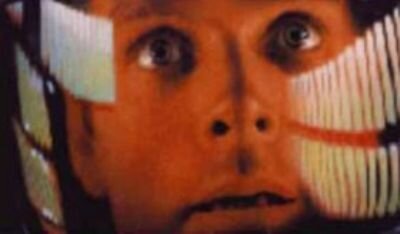| |
|
|
| |
|
|
| |
2001: A Space Odyssey
© Kubrick Web Company - all rights reserved
|
| |
|
|
| |
 |
| Tookey's Rating |
|
|
7 /10
|
| |
| Average Rating |
|
|
9.58 /10
|
| |
| Starring |
| Gary Lockwood, Keir Dullea, William Sylvester |
| Full Cast > |
|
|
|
| |
Directed by: Stanley Kubrick 
Written by: Stanley Kubrick, Arthur C. Clarke, from the story The Sentinel by Arthur C. Clarke.
|
|
| |
|
| Tookey's Review |
|
| Pro Reviews |
|
| Mixed Reviews |
|
| Anti Reviews |
|
| Trailer |
|
| Cast |
|
| |
 |
| |
| Released: |
1968 |
| |
|
| Genre: |
ADVENTURE
SCIENCE FICTION
EPIC
|
| |
|
| Origin: |
GB |
| |
|
| Colour: |
C |
| |
|
| Length: |
149 |
|
| |
|
| |
|
|
| |
|
|
The story of mankind, from apeman to spaceman.
|
Reviewed by Chris Tookey
|
2001 has maintained its reputation as a classic because, more than any other Science Fiction movie, it evokes the grandeur of space. Unfortunately, the ending looks more like a 60s acid trip than anything else and dates the film badly. And the small screen accentuates the absence of plot.
One reason why 2001 elicits very mixed reactions is that, like Blade Runner, it visualises a tediously dehumanised future, in which people are less human than machines. HAL, the spaceship computer, is the nearest the film has to a fully developed character.
Contemporary critics were mostly enthusiastic, though vague about what the film actually meant. A few found it turgid and pretentious, however, and such doubts have persisted. The best way to enjoy the film is to slip the logical parts of one’s mind into neutral and abandon yourself to the experience; the film has always had a following among junkies.
In 1968, Stanley Kubrick explained why he made the film and noticeably fought shy of philosophical or allegorical analysis:
“I tried to create a visual experience, one that bypasses verbalized pigeonholing and directly penetrates the subconscious with an emotional and philosophical content ... I intended the film to be an intensely subjective experience that reaches the viewer at an inner level of consciousness, just as music does.”
Not surprisingly, the special effects won an Academy Award. The art direction (Tony Masters, Harry Lange and Ernie Archer) was nominated. Peter Hyams made an underrated sequel, 2010 (1984), which is worth seeing for its special effects.
|
|
|
|
